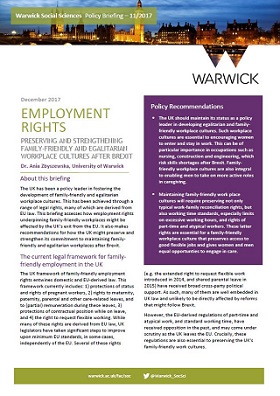Turning back the clock? Employment rights after Brexit
 Employment rights – Preserving and strengthening family-friendly and egalitarian workplace cultures after Brexit examines how Brexit may affect UK employment rights for parents and carers.
Employment rights – Preserving and strengthening family-friendly and egalitarian workplace cultures after Brexit examines how Brexit may affect UK employment rights for parents and carers.- The paper is the fourth Warwick Brexit Briefing on Employment by the University of Warwick and its Connecting Research on Employment and Work (CREW) network.
- Over the last 20 years, the UK has become a leader in creating an employment culture that promotes work-family balance and assists working parents.
- These rights derive from UK and EU laws. They help parents and carers access good jobs, give flexibility to balance work and family obligations, promote women’s access to work and encourage men to take on caring responsibilities.
- While some family-friendly rights are entrenched, other rights essential to balancing work and family are more controversial and may be eroded after Brexit.
The University of Warwick has published the fourth in a series of briefings exploring the implications of Brexit for the job market, workers’ rights, and employment policy.
Employment rights – Preserving and strengthening family-friendly and egalitarian workplace cultures after Brexit examines how Brexit may risk a return to parents and carers becoming trapped in flexible jobs with fewer rights than full-time, permanent workers, and see men and women returning to entrenched gender roles.
The paper was written by Dr Ania Zbyszewska from the University of Warwick School of Law. She notes that the UK has been a policy leader in encouraging the development of family-friendly and gender-equal workplace cultures, often anticipating EU legal and policy developments, and has enjoyed wide-ranging social and economic benefits as a result.
Policies at risk of being eroded after Brexit include limits on working hours derived from the EU Working Time Directive, and the rights of ‘atypical’ workers on part-time, casual or fixed-term contracts. These regulations have helped to promote better gender equality in the workplace:-
-
Many British men already work in excess of 48 hours per week. Long working hours make it more difficult for men to balance work and family life, and reinforce gender inequalities in pay and progression.
-
Historically, flexible roles were filled by women needing to reconcile work and family obligations. Before employment protections derived from EU directives were introduced, these roles were often associated with poor employment conditions, lack of benefits, no access to training, and unequal pay.
Commenting on her paper, Dr Zbyszewska said: “In this period of transition, as the UK readies itself for the process of withdrawing from the EU, it is important to remember that a work culture that is family and care friendly, and egalitarian, is also a long-term investment without which healthy societies, vibrant labour markets, and economic prosperity are not possible.
“The gains made over the last two decades are significant, but recent evidence shows that much more effort is necessary to deliver on the promise of a ‘family friendly’ workplace.
“This is not the time to turn back the clock on the rights that make reconciliation of work and family possible, and enable both women and men to enjoy a more equal share of the joys and burdens of professional and domestic work.”
The briefing paper recommends that the UK should maintain strong commitment to family-friendly employment rights after Brexit, and that this should be achieved by preserving rights to leaves and to request flexible work, but also the rights to annual leave, limits on excessive working hours, and protection for atypical workers.
Each of the Warwick Brexit Briefings on Employment has been written by experts from the University’s Connecting Research on Work and Employment (CREW) network and reflects current Warwick research. The briefing papers are presented to an invited audience of parliamentarians, employment organisations and other stakeholders in Westminster and are free to download .
Contact:
Sheila Kiggins,
Media Relations Manager, Social Science
+44 (0) 7876 218166
+44 (0) 2476 150 423
s.kiggins@warwick.ac.uk
